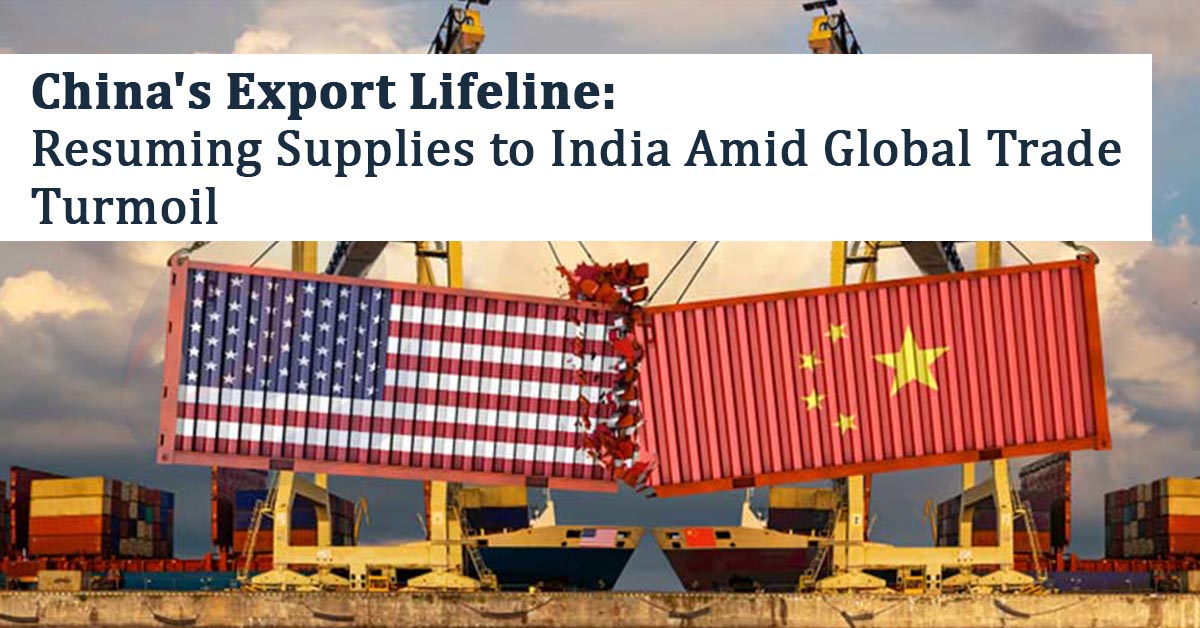
In a significant diplomatic breakthrough, China has lifted export restrictions on fertilizers, rare earth minerals, and tunnel boring machines (TBMs) to India, as confirmed during Chinese Foreign Minister Wang Yi’s visit to New Delhi on August 18, 2025. This decision, conveyed to Indian External Affairs Minister S. Jaishankar, marks a step toward normalizing bilateral ties strained by trade curbs and border tensions. The move comes as India navigates global economic challenges, including U.S. President Donald Trump’s punitive tariffs targeting Indian exports.
The Diplomatic Breakthrough
During Wang Yi’s two-day visit, he assured Jaishankar that China would resume shipments of fertilizers (crucial for agriculture), rare earths (vital for auto and electronics industries), and TBMs (essential for infrastructure projects). These were key concerns raised by India during prior talks in July 2025. Jaishankar reiterated India’s unchanged stance on Taiwan, emphasizing economic and cultural ties, while both sides acknowledged the need for closer dialogue to counter U.S. trade policies.
The talks reflect a pragmatic shift. China’s earlier restrictions, imposed in April 2025 amid global trade wars, disrupted India’s supply chains. The U.S., under Trump, extended a trade truce with China while imposing 25-50% tariffs on India due to its ties with Russia, creating a complex geopolitical backdrop. Both nations see mutual benefit in easing tensions to mitigate these external pressures.
Why the Curbs Mattered
China’s export halts, which began in mid-2025, targeted critical sectors:
- Fertilizers: China supplies ~30% of India’s fertilizer needs, including Di-Ammonium Phosphate (DAP), vital for the Rabi season. Curbs led to shortages, threatening agricultural output and food security.
- Rare Earths: India relies on China for 80-85% of rare earth magnets, used in electric vehicles (EVs), wind turbines, and electronics. Restrictions caused production delays in the auto and electronics sectors.
- Tunnel Boring Machines: Delays in TBM shipments stalled major infrastructure projects, including metro systems and road tunnels, impacting India’s $1.4 trillion National Infrastructure Pipeline.
These disruptions, driven by security concerns and retaliatory trade measures, exacerbated India’s vulnerabilities amid global supply chain strains and U.S. tariffs.
Economic Impact on India
The resumption of exports is a lifeline for India’s $3.9 trillion economy, projected to grow at 6.5-7% in FY 2025-26. Here’s a sector-wise analysis:
| Sector | Dependency on China | Impact of Resumption |
| Agriculture | 30% of fertilizers | Stabilizes input costs, averts DAP shortages, supports 45% of workforce. Could reduce food inflation (~7%). |
| Manufacturing | 80-85% of rare earths | Eases supply chains for $100B+ auto/EV sector, supports FAME scheme, reduces import costs. |
| Infrastructure | TBMs for key projects | Accelerates metro/road projects, boosts jobs, stimulates steel/cement demand. |
The lifting of curbs could prevent a potential 0.5-1% GDP loss flagged by earlier disruptions. Indian markets responded positively, with fertilizer stocks like Coromandel International gaining up to 5% on August 19, 2025. However, Trump’s tariffs, targeting $78.5 billion in Indian exports (e.g., textiles, pharma), pose risks. A 25-50% tariff hike could shave $20 billion off trade, impacting jobs in labor-intensive sectors.
Navigating Global Turmoil
Trump’s policies, including a 10% universal tariff and higher levies on India, threaten export-dependent industries. India’s response includes diversifying supply chains (e.g., exploring rare earth sources in Jordan) and boosting domestic production via the National Critical Mineral Mission. The China deal aligns with India’s strategy to balance U.S. alliances with pragmatic ties to Beijing, especially as the U.S. eases high-end chip exports to China while targeting India.
Conclusion
China’s decision to lift export curbs is a strategic win for India, easing supply chain bottlenecks and supporting key sectors. As global trade fragments under Trump’s tariffs, India’s diversified economy and diplomatic outreach to China offer resilience.
Disclaimer
This blog is for educational purposes only. The securities mentioned are examples and not stock recommendations. This does not constitute financial advice. Investors must conduct their own research and consult financial experts before making investment decisions.
Investments in securities market are subject to market risks, read all the related documents carefully before investing.


